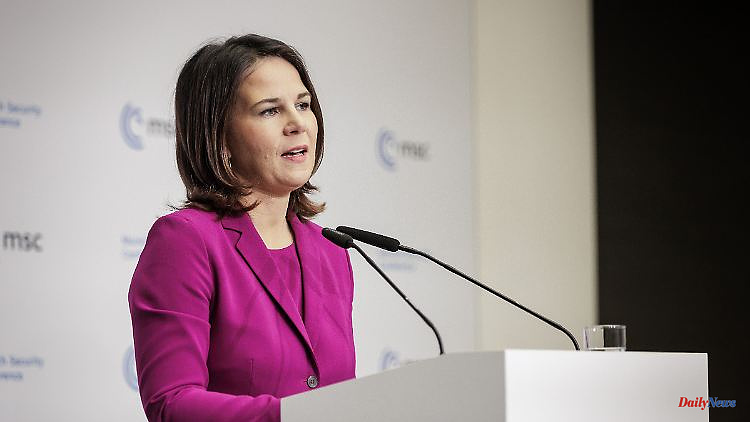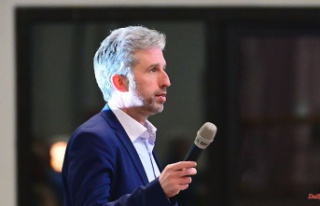Next week the Federal Foreign Office intends to present the guidelines for a feminist foreign policy. In Munich, department head Baerbock explains why she wasn't initially enthusiastic about the task of being the first female foreign minister to proclaim Germany's first feminist foreign policy.
A room full of women at the Munich Security Conference is something special in itself. And this is where vice presidents, secretaries of state, secretaries of defense, Nobel laureates, Hollywood actors, human rights activists and journalists sit. Almost 100 top-class female guests met at the invitation of the Frauen100 network and the Center for Feminist Foreign Policy CFFP for an official MSC side event in the Charles Hotel. The topic: feminist foreign policy.
One of the best-known representatives of this is probably Foreign Minister Annalena Baerbock, who insists on giving the opening speech. A little excited, after all she has to speak in English, she ends up speaking for a good half an hour - almost three times as long as planned. She obviously has a lot to say. After all, she has recently been criticized time and again, especially with regard to the revolution in Iran: Many activists would have wished for more "feminist foreign policy" here.
Some of them are sitting at the table today. Like the Iranian Hollywood actress and human rights activist Nazanin Boniadi. As part of the exile opposition, she has much praise for Baerbock, but also hopes for support "to classify the Islamic Republic's Revolutionary Guard as a terrorist organization." It is the first time that the Islamic Republic has been disinvited from the Munich Security Conference and members of the exile opposition have been invited. A strong sign.
In an interview with RTL/ntv, Nazanin Boniadi explains: "History has shown that movements in which women play a major role are more successful than those in which they play a secondary role. In Iran we are seeing a revolution led by women. Women are the engine of the protests here." Because women were the first to be disenfranchised by the mullahs. Woman Lives Freedom! With this slogan arises in Iran the first women's revolution in the world, which is supported by men.
Baerbock would like to take up all of this – but in many places her speech seems more like an attempt at an explanation. For many, feminism is still a "trigger word", something that provokes. And that's why she wasn't all that enthusiastic about proclaiming feminist foreign policy in the Foreign Office at first. After all, the mere fact that she is Foreign Minister as a 42-year-old woman with two children is feminist and a provocation. But the Greens had just pushed it through in the coalition agreement - "You're welcome!" someone shouts - and they accept the task.
For example, by always making meeting women a priority on her travels. On Palau, for example, she meets the women who are traditionally responsible for agriculture in the Pacific island state and who are particularly hard hit by the consequences of climate change. In Uzbekistan she visits a women's shelter. These are by no means "feel-good appointments" for them. On the contrary, one cannot prepare for it. And she meets some of the most powerful women there. It's not about pitying the victims. It is about recognizing the struggle of women for justice worldwide.
The Federal Foreign Office says it is about promoting the rights, representation and resources of women and marginalized groups. In addition, diversity should be promoted. Exactly what that means in practice is yet to be worked out. On March 1, the Federal Foreign Office plans to present its guidelines on feminist foreign policy.
Sometimes even with this approach she reaches her limits, says Baerbock, citing Afghanistan as an example. When the Taliban announced in December that women were no longer allowed to work in international aid organizations because there was no guarantee that they would adhere to the Islamic dress code, she was faced with the question: "Do we continue to pay aid to this misogynist system, or do we stop the payments immediately, risking that thousands of Afghan children will no longer receive much-needed aid?" In such moments, she relies on the expertise of human rights activists from the region and calls on the women in the room "so please pick up the phone if I call you in the middle of the night". For her, feminist foreign policy means sometimes asking for help.
Many in the room don't need to be said twice and want to speak to her immediately after the speech. The focus is on the revolution in Iran. After all, it is directly related to the war in Ukraine. According to feminist foreign policy, no one is safe until women are safe.
Kristina Lunz, the founder of the Center for Feminist Foreign Policy, says that long-held conventions would have to be fundamentally rethought. Feminist foreign policy stands for a move away from security through weapons and global armament, especially in the form of nuclear weapons.
The concept strives for a so-called positive peace. What is meant is to overcome poverty, hunger, structural violence and inequality. In concrete terms, this is to be achieved, for example, in the area of development cooperation through greater involvement of local actors. With a view to the Russian war of aggression in Ukraine, many analysts say this approach has failed. The women counter that Russia's President Vladimir Putin is also waging the war with Iran's support.
Journalist Natalie Amiri, who was a correspondent in Iran for five years, explains: "Putin will definitely be strengthened by the Islamic Republic. The drones that are now flying over Kiev and causing destruction are being delivered from Iran. 80 drones alone were sent in 48 hours shot down earlier this year. According to military experts, this war will last longer as long as the Islamic Republic of Iran continues to send weapons to Russia. And in return, Tehran also gets weapons. In March, 24 fighter jets are to be delivered from Russia to Iran. In this respect, this alliance is really not good at all in terms of world peace."
Nazanin Boniadi is certain that the time has come for a new Iran policy in the West, from which the international community can only benefit. It's about women's life freedom. Woman Life Freedom. a process. A movement that Baerbock can significantly support with its feminist foreign policy. And which could completely change the security policy structure of the world.












